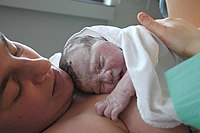
Photo from wikipedia
The Partnership for HIV-Free Survival (PHFS) was piloted in rural Kenya using a quality improvement approach to integrate nutrition with prevention of mother-to-child transmission (PMTCT) of HIV services. Data were… Click to show full abstract
The Partnership for HIV-Free Survival (PHFS) was piloted in rural Kenya using a quality improvement approach to integrate nutrition with prevention of mother-to-child transmission (PMTCT) of HIV services. Data were collected in a preintervention baseline (January 2013 to August 2013) and 3 periods during implementation (September 2013 to June 2016). Integration of nutrition assessment, counseling, and support (NACS) in PMTCT and retention of mother–baby pairs (MBPs) in care showed significant increase over time: The MBPs receiving NACS increased from a baseline median of 15% to 88% (P ≤ .05), and the proportion of MBPs retained in active care increased from a baseline median of 19% to a median of 66% (P ≤ .01). Declines observed in the number of HIV-exposed infants who tested positive for HIV at 18 months were not statistically significant. The PHFS was successful in integrating NACS into PMTCT services and increasing retention of MBPs in care in Kenya.
Journal Title: Journal of the International Association of Providers of AIDS Care
Year Published: 2019
Link to full text (if available)
Share on Social Media: Sign Up to like & get
recommendations!